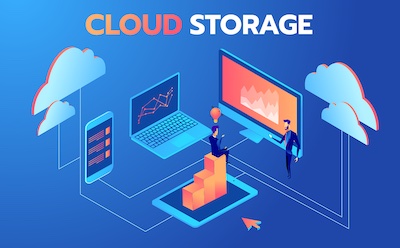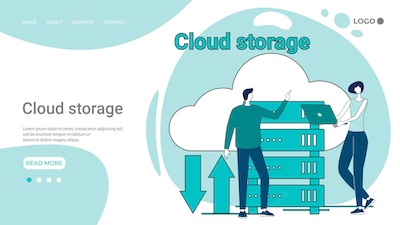 When it comes to technology, you have to stay ahead of the curve or risk losing out on business opportunities. Cloud storage solutions are becoming increasingly popular as businesses look for ways to cut costs without sacrificing functionality. Thankfully, cloud storage solutions can help you do both. When you implement a cloud storage solution in your business, you get many benefits that make it worth the initial setup cost and ongoing expenses:
When it comes to technology, you have to stay ahead of the curve or risk losing out on business opportunities. Cloud storage solutions are becoming increasingly popular as businesses look for ways to cut costs without sacrificing functionality. Thankfully, cloud storage solutions can help you do both. When you implement a cloud storage solution in your business, you get many benefits that make it worth the initial setup cost and ongoing expenses:
More efficient use of space and equipment
When you use a cloud storage solution, you offload your data from your own equipment and onto the cloud provider’s equipment. This means less equipment at your business location and less space needed to house it. It also means less maintenance is required to keep your equipment running because you don’t have to worry about software updates, cooling systems, and other factors that can cause downtime. Also, the reduction in equipment frees up space for your business to focus on growing. Whether you lease or own your physical space, it can be challenging to find ways to make better use of the space you have. Cloud storage solutions allow for better utilization of space by removing data storage as an equipment and space concern as well as providing more flexibility in terms of equipment growth.
Reduced reliance on physical storage
When you rely on a cloud storage solution, you don’t need to purchase as much physical space for data storage. Some cloud storage providers will even let you offload work-in-progress data that you might otherwise need to store onsite. This reduction in the amount of data you need to store onsite can help you reduce your capital expenses. You might also consider a hybrid storage solution, which allows you to keep some data onsite while offloading the rest to the cloud.
Reduced costs for data storage, maintenance, and repairs
Data storage is one of the largest business expenses, especially if you use a service provider to house your data. However, cloud storage solutions can help you reduce costs by taking responsibility for the data storage equipment and associated costs. Businesses have many options for data storage solutions, including but not limited to physical servers, network-attached storage, and disk-based storage systems (such as SAN or NAS). These solutions can be expensive, especially if you don’t have the in-house expertise to manage and maintain them. Cloud storage solutions, on the other hand, are managed by the cloud provider and are therefore less likely to cause downtime due to maintenance issues.
Improved disaster recovery capabilities
A natural disaster can cause significant damage to data if you don’t have a disaster recovery plan in place. With a disaster recovery plan, you can minimize the impact of a disaster on your business and customer relationships. But without a disaster recovery plan, you might not be able to get to your data promptly. If you store your data in multiple locations, such as onsite and on the cloud, you give yourself more flexibility in terms of disaster recovery. If one data location is damaged, you can easily access the other data without having to rebuild it.
Faster access to data for employees and customers
When you use a cloud storage solution, you don’t need to worry about where the data is located. This means faster access to data for your employees and customers. If you’re storing your data onsite, it’s important to know where the data is and how quickly your employees can access it. If you don’t have an automated inventory tracking system in place, your employees may spend hours looking for the right data. But with a cloud storage solution, your employees can access the data quickly and easily.
Better collaboration between employees and partners
There are many ways to collaborate remotely, but email and file-sharing tools are the most common. But these tools don’t provide the same level of visibility and security that some businesses need. With a cloud storage solution, your teams can interact with the data using their preferred tools. This means better visibility into data sources, more control over who can access the data, and an overall better experience for the team.
Mapping Out Your Cloud Storage Needs and Options
To select the right cloud storage solution for your business, you first need to determine the types of data you need to store. Once you know which data you have, you can determine how you want to store it and whether it’s feasible to store it in the cloud. You also need to consider the future need to store data in the cloud. Some data is better suited for onsite storage, while other data might be better off in the cloud.
What to Look for in a Cloud Storage Service Provider (SP)
No matter which cloud storage solution you choose, you want to select a provider that meets your needs and is trusted by businesses in your industry. Here are some factors to consider when choosing a cloud storage provider: - Data security and compliance: Make sure the provider has a strong track record when it comes to data security. A reputed provider uses encryption for data at rest and data in transit, as well as regular assessment and audits of its compliance with industry standards. - Data storage: Does the provider offer the type of data storage you need? Some providers specialize in a certain type of data, such as images or videos. - Data transfer: If you need to regularly transfer data between providers, check to see whether the provider has a solution for that. - Data analytics: Some providers offer tools that help you understand your data better. This can help you identify trends and make better decisions. - Ease of use: You want to select a provider that makes it easy to store and access your data. Check online reviews to see how other businesses rate the provider’s user experience. - Reputation: Trust is important in any industry, and it’s especially important when handling sensitive data. Make sure you select a provider with a strong track record.
Common Objections to Cloud Storage Solutions
There are a variety of objections businesses have when it comes to using cloud storage solutions. Some of the most common are: - Data security: Some businesses are concerned about the security of cloud storage solutions. However, it’s important to remember that all reputable providers have invested heavily in data security to protect against threats such as malicious attacks, natural disasters, and human error. - Data ownership: Some businesses worry about who owns the data when it’s stored in the cloud. However, reputable providers have clear data retention policies with which they comply. This means that if the data is necessary for your business purposes, the provider will store it until you decide to delete it. - Data loss: This is a common misconception about cloud storage solutions. With a proper backup solution in place, you have peace of mind knowing that your data is protected.
Conclusion
Cloud storage solutions provide businesses with a cost-effective way to store data. They also provide more flexibility than traditional data storage methods. When you select the right provider and understand your data needs, you can enjoy the many benefits of cloud storage.














